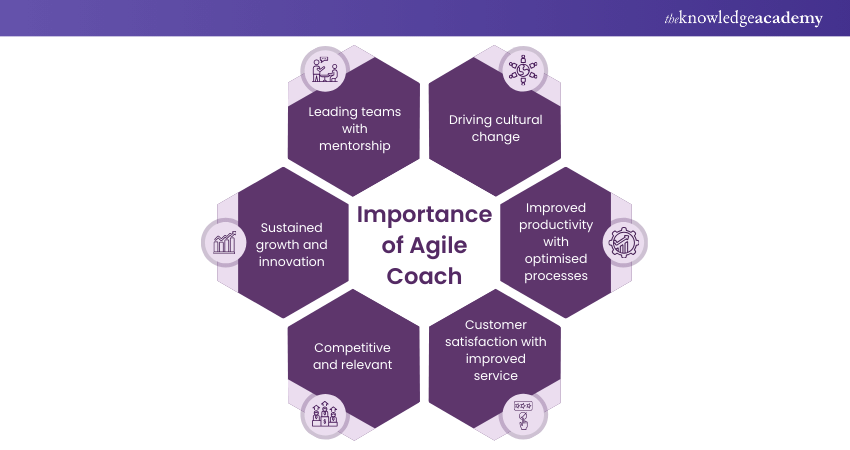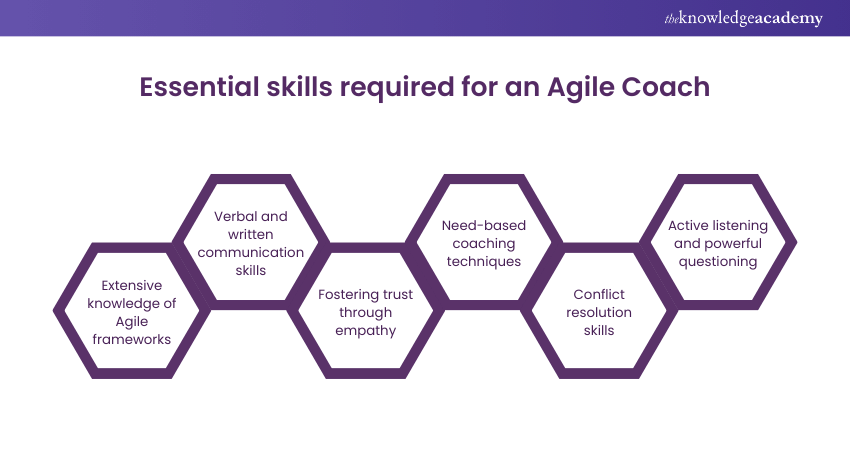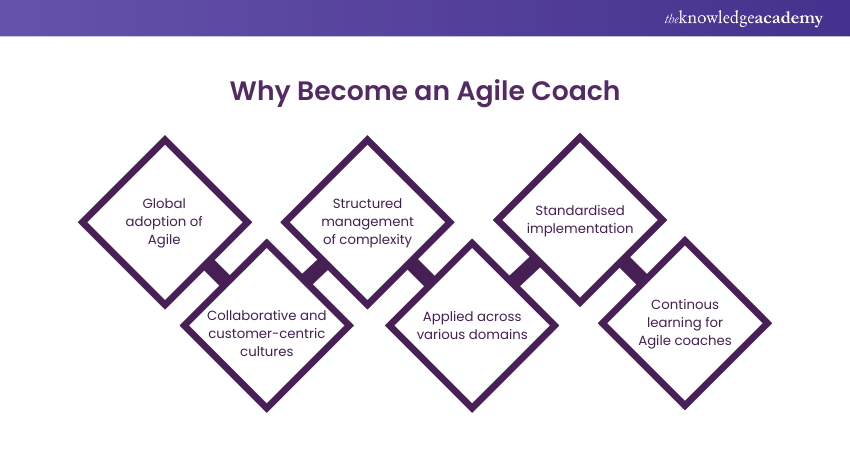We may not have the course you’re looking for. If you enquire or give us a call on +44 1344 203999 and speak to our training experts, we may still be able to help with your training requirements.
Training Outcomes Within Your Budget!
We ensure quality, budget-alignment, and timely delivery by our expert instructors.

The role of an Agile Coach has become more crucial as organisations strive to become more adaptive and responsive. The need for skilled professionals who can guide them through the intricacies of Agile methodologies is on the rise, which is why it is vital to understand How to Become an Agile Coach.
If you're interested in How to Become an Agile Coach, this comprehensive blog will provide you with the insights, skills, and steps required to embark on this rewarding career path. Learn more about How to Become an Agile Coach by achieving the necessary degrees, master the principles of Scrum, acquiring practical experience, and pursuing additional education.
Table of Contents
1) What is an Agile Coach?
2) The importance of Agile Coaches
3) How to Become an Agile Coach?
4) Essential skills required for an Agile Coach
5) Why become an Agile Coach?
6) Conclusion
What is an Agile Coach?
An Agile Coach is a seasoned professional who serves as a guiding force within organisations transitioning to or practicing Agile methodologies. Their primary role is to enable teams and individuals to understand, embrace, and implement Agile principles and practices effectively.
Additionally, Agile Coaches act as mentors, facilitators, and change agents, fostering a culture of agility. They assist in breaking down silos, promoting collaboration, and nurturing a continuous improvement mindset.
Furthermore, they possess deep knowledge of Agile frameworks like Scrum, Kanban, or Lean. Thus, an Agile Coach helps teams and leaders adapt to the ever-evolving demands of today's fast-paced business environment.
They possess strong communication, empathy, and Conflict Resolution skills, enabling them to build and sustain strong relationships while addressing challenges within teams. An Agile Coach is a catalyst for change within organisations, guiding teams and leaders towards the adoption of Agile principles and practices.
More importantly, Agile Coaches play a crucial role in ensuring that organisations successfully transition to or maintain agility. This quality enables them to stay competitive and responsive to change.

The importance of Agile Coaches
Agile Coaches are indispensable assets to organisations in today's dynamic and competitive business landscape. Here are key reasons why Agile Coaches are crucial to organisations:

a) Guidance in Agile adoption: Agile Coaches possess extensive knowledge and experience in Agile methodologies. They provide guidance and mentorship, ensuring that teams and leaders understand and effectively implement Agile practices. This accelerates the organisation's transition to agility.
b) Cultural transformation: Agile Coaches are instrumental in instilling an Agile mindset. They drive cultural change by encouraging transparency, adaptability, and a focus on delivering customer value. This cultural transformation is vital for long-term success.
c) Enhanced productivity: Agile practices, when implemented effectively, lead to increased productivity and efficiency. Agile Coaches help teams optimise their processes, minimise waste, and create a streamlined workflow, resulting in more efficient work output.
d) Improved quality: Agile emphasises quality at every stage of development. Agile Coaches guide teams in maintaining high standards, which leads to improved product or service quality and better customer satisfaction.
e) Flexibility and adaptability: Organisations must be flexible and adaptive. Agile Coaches help teams and leaders become responsive to change, enabling the organisation to stay competitive and relevant.
f) Continuous improvement: Agile Coaches foster a culture of continuous improvement, where teams are encouraged to reflect on their processes and identify areas for enhancement. This commitment to ongoing learning leads to sustained growth and innovation.
Acquire the skills to be a competent leader by signing up for our Agile Project Management Foundation & Practitioner (AgilePM®) Course now!
How to Become an Agile Coach?
Becoming an Agile Coach is a rewarding and impactful career path, but it requires a strategic approach and dedication. Here's a step-by-step procedure on How to Become an Agile Coach:
a) Gain in-depth Agile knowledge: To Become an Agile Coach, you must have a strong foundation in Agile principles and methodologies. Start by acquiring a deep understanding of frameworks such as Scrum, Kanban, Lean, and Agile Manifesto principles. This knowledge forms the bedrock of your coaching skills.
b) Hands-on experience: Actively participate in Agile projects or teams. Whether as a Scrum Master, Product Owner, or team member, gain practical experience in the day-to-day operations of an Agile environment. This firsthand experience will provide invaluable insights and credibility.
c) Obtain relevant certifications: Consider obtaining Agile certifications to solidify your knowledge and demonstrate your commitment to Agile Coaching. The Scrum Master Certification, Scrum Product Owner Training, and PMI-ACP Certification Training are highly regarded in the industry.
d) Develop coaching skills: Coaching is an art in itself. Learn and practice coaching techniques such as active listening, powerful questioning, providing constructive feedback, and fostering self-discovery. These skills are vital for guiding teams and individuals effectively.
e) Seek mentorship: Find an experienced Agile Coach to mentor you. A mentor can offer valuable insights, share their experiences, and provide guidance on your coaching journey. They can help you navigate challenges and make informed decisions.
f) Gain a diverse skill set: Expand your skill set by learning different Agile frameworks and related practices. This versatility will enable you to adapt to the unique needs of various teams and organisations.
g) Develop empathy and emotional intelligence: Being an effective Agile Coach requires empathy and emotional intelligence. Understanding and connecting with the emotions and perspectives of team members and leaders is vital for building trust and strong relationships.
h) Network and stay informed: Engage with the Agile community by attending meetups, conferences, and online forums. Networking with other professionals in the field can provide support, knowledge sharing, and opportunities for growth.
i) Build a coaching portfolio: Document your coaching journey, including successful case studies, testimonials, and evidence of the impact you've had on teams and organisations. A portfolio demonstrates your experience and ability to make a difference.
j) Practice, reflect, and refine: Start coaching small groups or individuals within your organisation or network. Practice is key to improving your skills. Regularly seek feedback from those you coach and engage in self-reflection to refine your coaching approach.
k) Obtain feedback and certification: As you gain experience, consider seeking feedback from your peers and clients to assess your progress. You may also explore advanced certifications that are tailored to Agile Coaching.
l) Be patient and persistent: Becoming an Agile Coach is a journey that takes time and persistence. Not every opportunity will come easily, and progress may be gradual. Be patient, stay committed, and continue learning.
Apply Scrum techniques to your projects by signing up for our Scrum Master Certification now!
Essential skills required for an Agile Coach
Agile Coaches play a pivotal role in organisations seeking to adopt and thrive in an Agile environment. They must possess a diverse and comprehensive skill set to effectively guide teams and leaders through the complexities of Agile transformation. Here are the essential skill sets required by Agile Coaches:

a) Deep understanding of Agile methodologies: An Agile Coach must have a profound knowledge of various Agile frameworks such as Scrum, Kanban, Lean, and others. They should understand the principles, values, and practices that underpin these methodologies.
b) Strong communication skills: Effective communication is a cornerstone of Agile Coaching. Agile Coaches need to excel in both verbal and written communication to convey complex concepts, facilitate meetings, and provide feedback to teams and individuals.
c) Empathy and emotional intelligence: Agile Coaches must possess high levels of empathy to connect with team members and leaders. They need to understand their perspectives, concerns, and emotions, fostering trust and collaboration.
d) Adaptability: Agile environments are inherently dynamic, and change is constant. Coaches need to be adaptable, open to change, and capable of adjusting their coaching approaches based on the unique challenges and needs of teams and organisations.
e) Conflict Resolution skills: Agile Coaches often deal with interpersonal conflicts within teams. Strong conflict resolution skills are essential to mediate disputes and maintain a positive and productive work environment.
f) Servant leadership: Agile Coaches embody servant leadership, putting the needs of their teams and coaches above their own. They empower teams to make decisions and encourage self-organisation.
g) Coaching skills: While Agile Coaching is a form of leadership, it is also a coaching role. Coaches need to be skilled in coaching techniques such as powerful questioning, active listening, and providing constructive feedback.
h) Continuous learning: Agile is a continuously evolving field. Coaches must stay up-to-date with the latest trends, tools, and practices through continuous learning, which may include attending workshops, conferences, and courses.
i) Mentoring and facilitation skills: Agile Coaches often act as mentors and facilitators. They should have the ability to guide teams and individuals effectively, facilitate Agile ceremonies, and provide constructive guidance for improvement.
j) Technical skills: Some organisations may require Agile Coaches to have a technical background, enabling them to understand the intricacies of software development, IT infrastructure, or other technical aspects related to their industry.
k) Business acumen: Understanding the business context and goals of the organisation is vital for Agile Coaches. They need to align Agile practices with the broader objectives of the company.
l) Change management: Agile Coaches are change agents who must be well-versed in change management principles and practices. They help organisations navigate the cultural and structural changes required for Agile adoption.
m) Data-driven decision-making: Agile Coaches should be capable of leveraging data and metrics to guide teams in making informed decisions and to track the progress of Agile initiatives.
n) Team building: Building high-performing teams is a crucial aspect of Agile Coaching. Coaches must understand the dynamics of teamwork, motivation, and collaboration.
o) Conflict resolution: Agile Coaches need to be skilled in addressing conflicts and challenges within teams and organisations. They should be able to mediate and facilitate constructive discussions to reach resolutions.
p) Leadership and influencing skills: Agile Coaches often work with leaders and executives. They must have the ability to influence and guide senior management in embracing Agile practices and values.
Foster collaboration and establish your product’s vision by signing up for our Scrum Product Owner Training now!
Typical Duties of an Agile Coach
An Agile Coach plays a multifaceted and critical role within organisations by facilitating the successful adoption and execution of Agile methodologies. Their job duties are wide-ranging and encompass various responsibilities:
a) Education and training: Agile Coaches educate teams and individuals on Agile principles, methodologies, and practices. They conduct training sessions, workshops, and provide learning resources to ensure a shared understanding of Agile concepts.
b) Mentorship: Agile Coaches act as mentors, guiding teams and leaders as they apply Agile principles to their work. They offer support, encouragement, and personalised feedback to help individuals and teams continuously improve.
c) Facilitation: Agile Coaches facilitate Agile ceremonies and meetings, such as sprint planning, daily stand-ups, retrospectives, and backlog refinement. They ensure that these gatherings run smoothly, encouraging active participation and collaboration.
d) Cultural transformation: Agile Coaches drive cultural change by fostering an Agile mindset within the organisation. They promote values like transparency, adaptability, and customer focus, aiming to create an environment conducive to agility.
e) Process optimisation: They work closely with teams to refine and optimise their Agile processes. Agile Coaches help identify bottlenecks, inefficiencies, and areas for improvement, contributing to higher productivity and quality.
f) Performance measurement: Agile Coaches often establish metrics and key performance indicators (KPIs) to track the progress and effectiveness of Agile initiatives. They use data to assess the impact of Agile practices on teams and the organisation.
g) Leadership development: Agile Coaches work with leaders and managers to foster a servant leadership style. They support the development of leadership skills that empower teams and encourage collaboration.
Network and learn! Engage with Agile communities online or in person to exchange insights and tips on tackling Agile interview Questions.
Why Become an Agile Coach?
The future prospects of an Agile Coach in the business world are exceptionally promising. As businesses continue to evolve at an unprecedented pace, the demand for agility and adaptability is growing rapidly.
Agile Coaches play a pivotal role in helping organisations navigate this change. Here are some key factors that indicate a bright future for Agile Coaches:

a) Increasing adoption of Agile: Agile methodologies have gained widespread acceptance across various industries, including IT, healthcare, finance, and more. This trend is expected to persist, creating a sustained need for experienced Agile Coaches.
b) Cultural transformation: Businesses recognise the significance of cultural transformation, and Agile Coaches are vital in driving this change. Organisations are increasingly focusing on creating Agile, customer-centric, and collaborative cultures.
c) Complexity of business challenges: As businesses face increasingly complex and uncertain challenges, Agile Coaching provides a structured approach to addressing them. Agile Coaches guide organisations in managing this complexity and thriving in the face of uncertainty.
d) Diverse applications: Agile methodologies are not limited to software development. They are being applied in areas such as marketing, HR, and project management, broadening the scope of Agile Coaching opportunities.
e) Global expansion: As businesses expand globally, Agile Coaches help in standardising Agile practices across different regions, ensuring consistent and effective implementation.
f) Continuous learning: The Agile field is dynamic, requiring professionals to stay updated with the latest trends and practices. Agile Coaches who commit to continuous learning and professional development will remain highly sought after.
Conclusion
In conclusion, the demand for Agile Coaches is on the rise, making it a promising career choice. With the right skills, experience, and commitment to continuous learning, individuals can embark on a successful journey on How to Become an Agile Coach. They can especially play a pivotal role in shaping the Agile future of organisations.
Implement Business Analysis skills in Scrum projects by signing up for our Agile Business Analysis in a Scrum Environment Course now!
Upcoming Project Management Resources Batches & Dates
Date
 Agile Project Management Foundation & Practitioner (AgilePM®)
Agile Project Management Foundation & Practitioner (AgilePM®)
Mon 10th Feb 2025
Mon 19th May 2025
Mon 14th Jul 2025
Mon 1st Sep 2025
Mon 27th Oct 2025
Mon 15th Dec 2025







 Top Rated Course
Top Rated Course


 If you wish to make any changes to your course, please
If you wish to make any changes to your course, please


